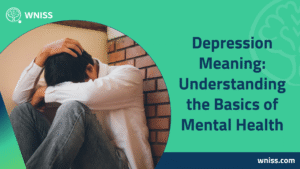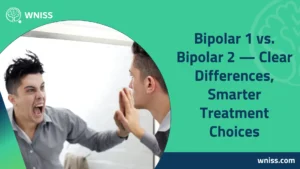If you live with schizophrenia, bad nights aren’t “just part of it.” Insomnia is common and treatable, and better sleep can ease daytime symptoms, sharpen thinking, and lower relapse risk. Research shows sleep disruption is tightly linked with symptom severity and quality of life in schizophrenia, and it often appears before flare-ups—making Schizophrenia and Insomnia a warning sign and a powerful treatment target. This guide turns the science into a practical plan: what’s actually happening at night, how clinicians assess sleep problems in schizophrenia, which treatments work (with and without medication), and a two-week routine you can run at home. By the end, you’ll know exactly where to start—and how to get expert online support when you want it.
What’s the Link Between Schizophrenia and Insomnia?
Sleep problems in schizophrenia aren’t one thing; they’re a cluster of patterns you can learn to spot and change.
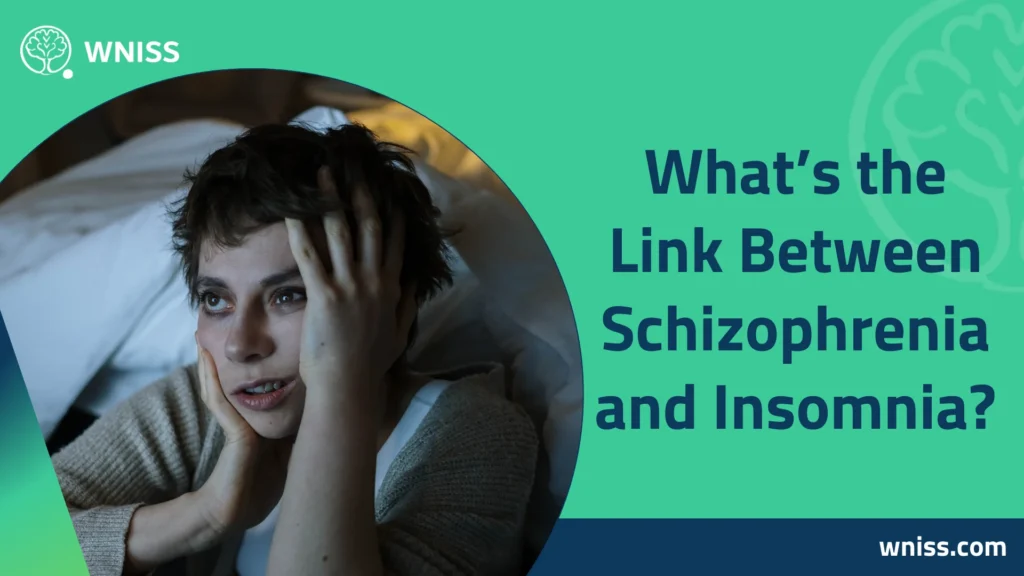
- Insomnia is common: multiple reviews report 30–80% of people with schizophrenia have sleep complaints; insomnia often co-occurs with more severe symptoms and worse daytime functioning. Translation: you’re not alone—and sleep is a legitimate treatment target.
- It’s not just “less sleep”: you may see longer time to fall asleep, more night awakenings, less slow-wave sleep, and circadian rhythm flips (awake at night, sleepy by day).
- Why it matters: disrupted sleep is linked with worsening psychotic experiences, cognition hits, and diminished life quality; it can precede relapses.
- “Sleeping too much” is also a thing: hypersomnia or daytime sleepiness can come from sedating medications, depression, or an inverted body clock—so the fix isn’t always “more sleep,” it’s better-timed sleep.
Why Does Sleep Go Off?
There’s no single cause; think biology + rhythms + environment + treatment side effects. Use this list to spot your biggest levers:
- Circadian rhythm disruption: the brain’s clock can drift in schizophrenia, causing delayed bedtimes, irregular sleep–wake cycles, and “night-only” alertness. Morning light and consistent timing help realign the clock.
- Core symptoms: distress, voices, and racing/fragmented thoughts raise nighttime arousal and make the bed feel unsafe.
- Medications: some antipsychotics are sedating (helpful at night, groggy by day), while others are more activating. Dosing time matters; don’t change without your prescriber. (Guidelines for schizophrenia emphasize coordinated, long-term management.)
- Comorbid sleep disorders: obstructive sleep apnea, restless legs syndrome, and circadian sleep–wake disorders are common and treatable once identified.
- Stress & routine: irregular meals, caffeine late in the day, and low morning light keep the system revved at the wrong times.
Assessment That Leads to Action (More Than an “Insomnia Test”)
A good evaluation ends with a specific plan on your calendar.
- Structured sleep interview: bedtime/wake times, time-to-sleep, wake-after-sleep, naps, caffeine/alcohol, activity level, and nightmare/paralysis/parasomnia history. (Expect clinicians to review psychosis course and meds together.)
- Two-week data pack: simple sleep diary + actigraphy (watch tracker) if available. You’ll spot circadian drift and inconsistent anchors.
- Screen & rule-outs: apnea (snoring, pauses), RLS, depression, substance effects; adjust antipsychotic timing where appropriate.
- Set concrete goals: e.g., “asleep 6.5–8 hours in a fixed window by week 4,” not vague “sleep better.”
- Agree on a relapse-watch pair: a sleep signal (≤5.5 hours for 2 nights) + a daytime signal (speech speeding, ideas racing) triggers an earlier check-in.
What Actually Works (Evidence-Based Treatments You Can Use)
Treat sleep and psychosis in parallel. Integration beats “one magic fix.”
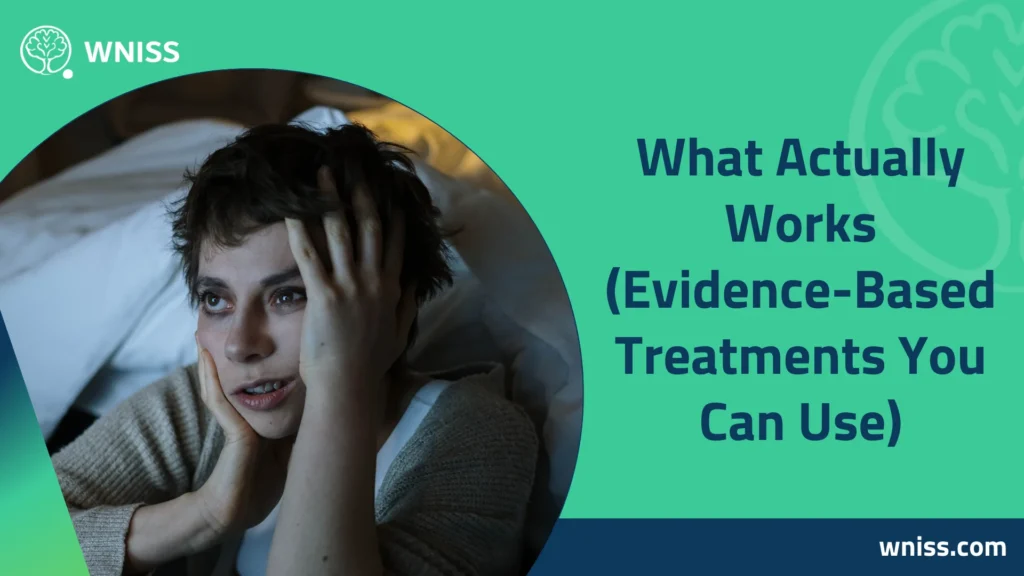
CBT-I first-line
Across adult insomnia, Cognitive Behavioral Therapy for Insomnia (CBT-I) is recommended as first-line—in person, group, or digital. It combines sleep scheduling, stimulus control (bed = sleep only), cognitive tools, and gentle restriction to consolidate sleep. Adapted CBT-I is feasible in schizophrenia and improves insomnia without worsening psychosis.
Behavioral scaffolds that matter:
- Fixed bed/wake window (±30 min) and morning light within 60 minutes of waking.
- Caffeine cutoff 8 hours before bed; alcohol is a sedative and sleep disrupter—keep early or avoid.
- Wind-down cue (dim lights + one calming activity), devices out of bed, and consistent daytime movement.
Medication choices (adjuncts, individualized):
- If CBT-I alone isn’t enough, prescribers may consider AASM-guided pharmacologic options short-term (e.g., doxepin, eszopiclone, zolpidem, lemborexant/suvorexant, ramelteon) while monitoring interactions and daytime sedation—especially alongside antipsychotics. Avoid routine first-generation antihistamines (tolerance, anticholinergic load).
- If sedation or activation from antipsychotics is the main driver, your team may retime doses or adjust agents per psychosis guidelines rather than piling on sleep meds.
- Programmatic care for psychosis: Coordinated specialty care (CSC) improves outcomes after first-episode psychosis; stable daytime routines support nighttime sleep.
Related topics to explore with your team: schizophrenia insomnia, schizophrenia and sleeping too much, schizophrenia sleep medication, schizophrenia at night only, and best sleep aid for schizophrenia—all should be tailored, measured, and time-limited when medications are used.
Sleep Tonight, Think Clear Tomorrow — Start WNISS’s Sleep+Schizo Plan
When nights spiral, the last thing you need is generic “sleep tips.” You need a coordinated plan that respects your diagnosis, meds, and daytime realities.
- Fast online assessment (days, not months): we map your sleep schedule, psychosis course, meds, and triggers, then deliver a 2-week CBT-I program adapted for schizophrenia.
- Therapy you’ll actually use: stimulus control, gentle sleep-window work, coping for voices at night, and circadian supports (light, timing) that fit your life.
- Medication coordination: we liaise with your prescriber to adjust dose timing or add short-term sleep agents only if needed, following AASM guidance.
- Dashboards you can trust: 60-second nightly logging with weekly reviews—you’ll see sleep efficiency improve.
- Discreet, online, life-fit: evenings/weekends available; privacy first.
Ready to get your nights back? Book a confidential session at WNISS and start the Sleep+Schizo Plan this week.
FAQs about Schizophrenia and Insomnia
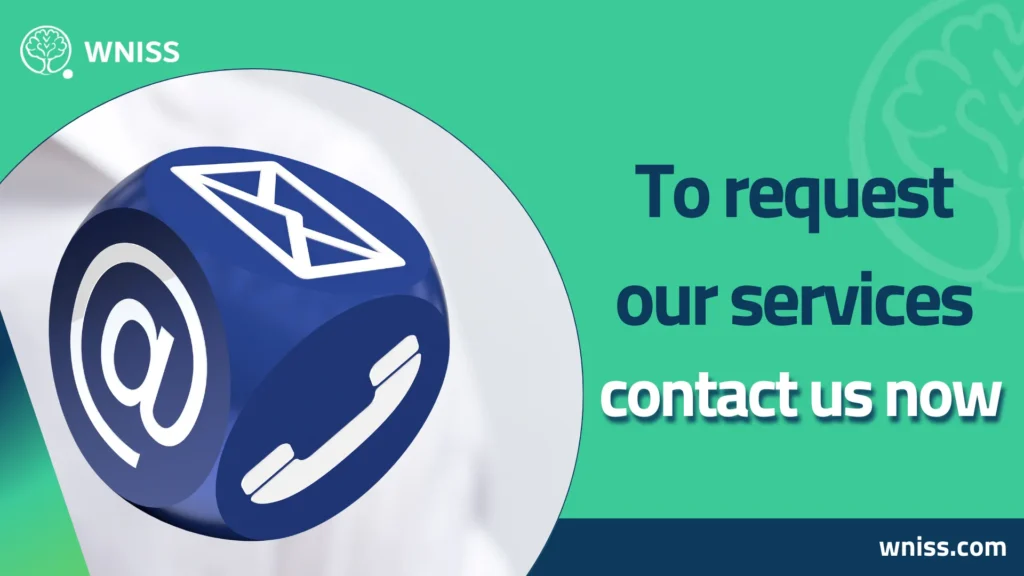
Can insomnia be a symptom of schizophrenia?
Yes. Insomnia is frequent in schizophrenia and is linked with worse daytime symptoms and quality of life; it can also foreshadow relapse. Treating insomnia (CBT-I + routine) improves sleep without worsening psychosis.
What triggers schizophrenia?
No single trigger. Genetic vulnerability + sleep/circadian disruption, stress, and substances can interact; missing meds also raises relapse risk. Stabilizing routines and early intervention (CSC programs) improve outcomes.
Do people with schizophrenia need less sleep?
Not typically. Many experience fragmented sleep or daytime sleepiness; some meds are sedating. The goal is enough sleep at the right times, not simply “less” or “more.”
Do people with schizophrenia sleep talk?
Sleep talking is a common parasomnia in the general population and isn’t specific to schizophrenia. If parasomnias are frequent or disruptive, ask for a sleep evaluation.
Is sleep paralysis schizophrenia?
No. Sleep paralysis is a REM-related parasomnia that can occur in anyone. It may co-occur with mental health conditions, but it is not schizophrenia. Persistent frightening episodes warrant a sleep-medicine review.
Poor sleep can make everything harder—voices feel louder, thinking slows, motivation drops. But insomnia in schizophrenia is treatable. With a measured plan (CBT-I principles, circadian anchors, smart medication timing) and simple weekly data, nights get calmer and days work better. If you want personalized guidance and coordination with your prescriber, WNISS can help you start online—privately and fast.
Medical References
- Kaskie RE, Ferrarelli F. Schizophrenia and sleep disorders: links, risks, and management. Neuropsychiatr Dis Treat. 2017. (Overview; sleep disturbance worsens psychosis and functioning.) PMC
- Ashton A, et al. Disrupted Sleep and Circadian Rhythms in Schizophrenia. Schizophr Res. 2020. (SCRD is common; ties to symptom severity and QoL.) PMC
- Wulff K, et al. Sleep and circadian rhythm disruption in schizophrenia. Curr Opin Neurobiol. 2012. (Circadian mechanisms and reversal.) PMC
- Vanek J, et al. Management of sleep disturbances in schizophrenia. Psychol Res Behav Manag. 2022. (Prevalence 30–80%; clinical tips.) Dove Medical Press
- Palmese LB, et al. Insomnia is frequent in schizophrenia… Schizophr Res. 2011. (Insomnia prevalence; links to outcomes.) PMC
- NICE CG178. Psychosis and schizophrenia in adults: prevention and management. (Care standards and coordinated interventions.) NICE
- AASM (Edinger JD, 2021). Behavioral and psychological treatments for chronic insomnia—clinical guideline. (CBT-I effectiveness.) PMC
- AASM (Sateia MJ, 2017). Pharmacologic treatment of chronic insomnia—clinical guideline. (When/how to use sleep meds.) jcsm.aasm.org
- Gangdev P. Isolated sleep paralysis & hypnic hallucinations. Indian J Psychol Med. 2015. (SP is distinct from psychosis; can co-occur.) PMC
- NIMH. Schizophrenia — Health Topic. (Core definition & resources.) المعهد الوطني للصحة النفسية



